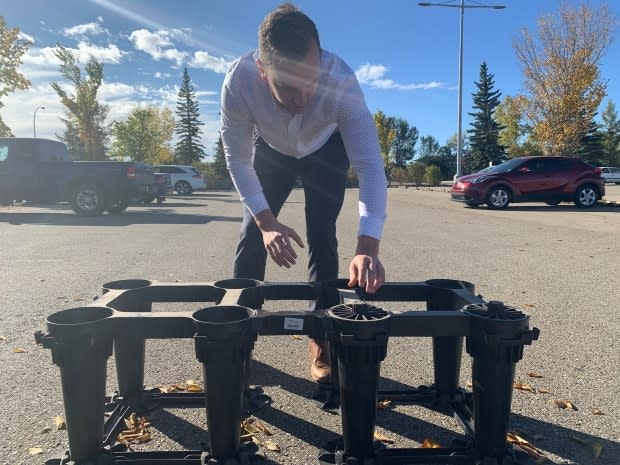Paved paradise? Why trees are thriving in the middle of a Mill Woods parking lot
Trees and parking lots do not always make a winning combination.
When planted beside pavement, without topsoil, trees often struggle to survive as soil compacts and roots find limited room to grow.
A row of eight Brandon elms running through the middle of a parking lot in Edmonton's Mill Woods neighbourhood is proving to be an exception — with the secret an underground system that increases soil volume.
Grids of Lego-like recycled plastic units made by the manufacturer Citygreen improve the trees' soil structure while still supporting the weight of cars on the paved parking lot.
Distributors from Edmonton's Norwood Waterworks company say the systems are more expensive to implement in the short term (they cost thousands of dollars per tree), but the long-term benefits are clear: trees live longer, saving municipalities more in replacement and labour costs.
Many urban trees die after just a few years, but the Brandon elms in the Mill Woods Sports Park are eight years old and could live between 40 to 50 years. The trees are already outperforming others nearby that were planted without the support system.
"It's a no-brainer," said Keith Lumby, Norwood Waterworks' general manager. His company distributes Citygreen's soil vaults in Alberta.
"I can't figure out why more people aren't doing this."
During a recent visit to the parking lot, Eric Keller, the company's technical sales account manager, demonstrated how the plastic units snapped together. Underground, the vaults form a matrix under each tree that is roughly six by six metres.

"And with that, there's obviously a large system of soil that the roots are growing out into as the tree gets older and grows larger," he said.
Citygreen, which has Canadian headquarters in Vancouver and offices in the U.S., Australia and New Zealand, is one of two manufacturers marketing systems like this in Canada.
The technology behind the soil vaults dates back to 2007.
Since then, the products have evolved and been installed in every Canadian province.

"Structured soils are marvelous things," said certified arborist Jim Hole, who is often frustrated by seeing urban trees struggle after being planted in substandard conditions.
Soil vaults and similar systems add structure to soil, giving roots more support and space for growth.
With more space to move, the roots can better acquire water and nutrients, Hole said.
Adding biochar, a type of charcoal, to soil can also enhance its structure and even sequester carbon, he said.
Two million trees
Keller and Lumby said the City of Edmonton is among the leading Canadian cities taking a proactive approach to urban trees.
The city has increased the required soil volume for trees planted in sidewalks or parking lots and its recently adopted growth plan — which sets out a vision for the next 45 years — includes a goal of planting two million urban trees.
"Landscaping architects as a community are looking for those initiatives that meet the city's vision requirements," Lumby said.
He said soil vault systems are already being used at about 40 sites in the greater Edmonton area, with more expected to be installed at new LRT stations.
"We're going to see more and more of these systems installed around the city," he said.

